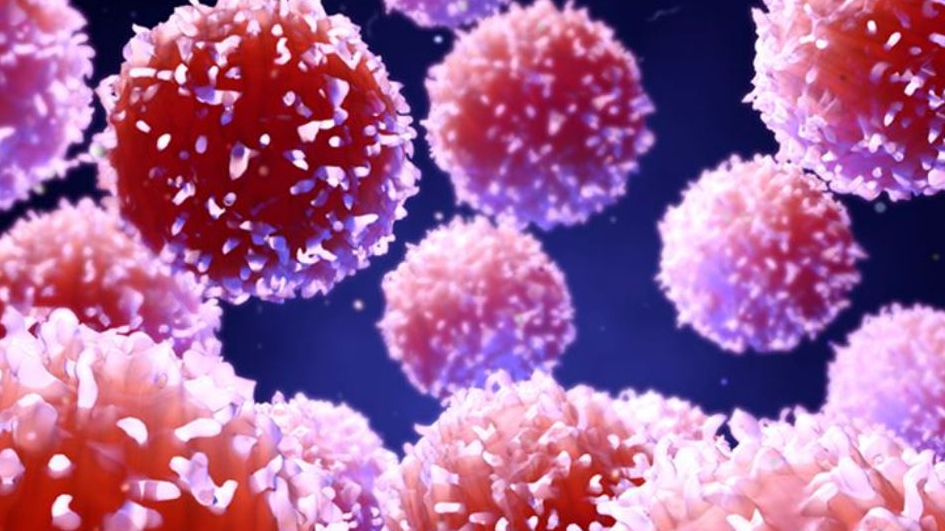
Image: B-cells lymphocytes that are responsible for producing antibodies. Credits: Adobe Stock.
Scientists at The Institute of Cancer Research, London, have created a compound that destroys a protein involved in driving cancers, including B-cell lymphoma.
The ‘molecular glue’-type degrader could ultimately, with further research, be developed into a cancer drug, and will also be a powerful tool to study cancer biology.
It’s an example of an innovative approach to drug discovery known as protein degradation, that aims to target cancer by taking advantage of the cell’s natural disposal system to remove proteins that can cause disease.
In a new study, the research team describes how the degrader selectively sticks to the BCL6 protein – a protein which B-cell lymphoma cells need to survive – and tags it to be destroyed.
BCL6 binds to the DNA and regulates genes that are involved in cell division and cell death. The protein is mutated in many cancers and finding a way to inhibit or reduce its levels could be a potential way to supress their growth.
An innovative discovery
The researchers sought to discover compounds that disrupt the function of the BCL6 protein and inhibit lymphoma cell growth. Their earlier work led to the identification of several compounds that had the potential to be developed further as BCL6 inhibitors.
The team observed that some of the inhibitors they created also had the extra ability to degrade the BCL6 protein. These previously reported small-molecule degraders were able to fully deplete BCL6 in cells, but they had low solubility in water which made it difficult to dose sufficient amounts of the compound in animal models to keep the BCL6 levels down.
In their new paper, published in The Journal of Medicinal Chemistry, the team build on their previous findings to report the first BCL6 molecular glue-type degrader with suitable properties to test in animal models. The study was funded by Cancer Research UK, the Cancer Research Technology (CRT) Pioneer Fund and Sixth Element Capital LLP.
By understanding what features of the molecule were needed to give the degrader effect, the team was able to create a potent compound that can bind to BCL6 more tightly and has improved water solubility, enabling sustained degradation of the protein in tumours in mice.
The new compound had a modest effect on BCL6 levels in studies in mice – with tumours growing significantly slower in the presence of the drug than in control tumours that received no drug.
Although the preliminary results in mice were modest, they suggest that BCL6-targeted molecular glue-type degraders could help control tumour growth in lymphomas in combination with other therapies.
The drug’s ability to cause sustained depletion of BCL6 also makes it a very powerful tool to study BCL6 biology.
How do molecular glue-type degraders work?
Protein turnover is a basic process that occurs in cells. It is controlled by the ubiquitin proteasome system, where specialised enzymes, including a family of proteins called the E3 ubiquitin ligases, recognise defective proteins and tag them with a small regulatory protein called ubiquitin.
Once tagged with ubiquitin, another part of the system detects it and takes the tagged protein to the proteasome – a protein complex that breaks down unnecessary or damaged proteins.
Molecular glue-type degraders are small compounds that facilitate interactions between a target protein and the ubiquitin proteasome system. They act in a different way to more traditional ‘small molecule’ drugs, which bind to a specific site on a protein and block its function.
While many small molecule drugs have been hugely successful cancer treatments, the protein degradation approach offers the hope of new therapies that hit currently ‘undruggable’ targets and potentially have long-lasting effects by completely removing proteins from cells.
Complex chemistry
Study co-leader Dr Benjamin Bellenie, Senior Staff Scientist in the ICR’s Centre for Cancer Drug Discovery, said:
“One interesting feature of our BCL6 project was that the initial compound we discovered from our screen had low solubility, which is not an ideal feature for drugs. With further investigations, we realised that the component contributing to low solubility was also giving the compound its ‘glue-like’ characteristic. This made it very challenging to optimise the molecule as any changes to improve its solubility often resulted in loss of its ability to stick to the target effectively.
“So, we’re thrilled to announce our discovery of a set of new molecular glue-type degraders for BCL6, which drives cancers including lymphoma. Our project was a delicate balance of optimising solubility of our candidate compounds without losing potency, and ultimately, we were able to create a compound that can bind BCL6 very tightly and form a ‘glued complex’ even at low concentrations.”
Study co-leader Professor Swen Hoelder, Head of Chemistry at the ICR, said:
“We’re very excited by the potential of protein degradation to deliver new drugs that could make a big difference in cancer treatment, and that’s why we founded our Centre for Protein Degradation here at the ICR. I’m pleased to announce the discovery of our new molecular glue-type degrader of BCL6 in this new study, which is also a great example of creative science in a cutting-edge, innovative field in cancer drug discovery.”
The ICR is currently making a significant investment in the Division of Cancer Therapeutics – which encompasses the Centre for Cancer Drug Discovery – with the recruitment of five new senior Faculty including roles in the Centre for Cancer Drug Discovery, the new Centre for Protein Degradation and the new Centre for Target Validation.
Current senior CCDD vacancies